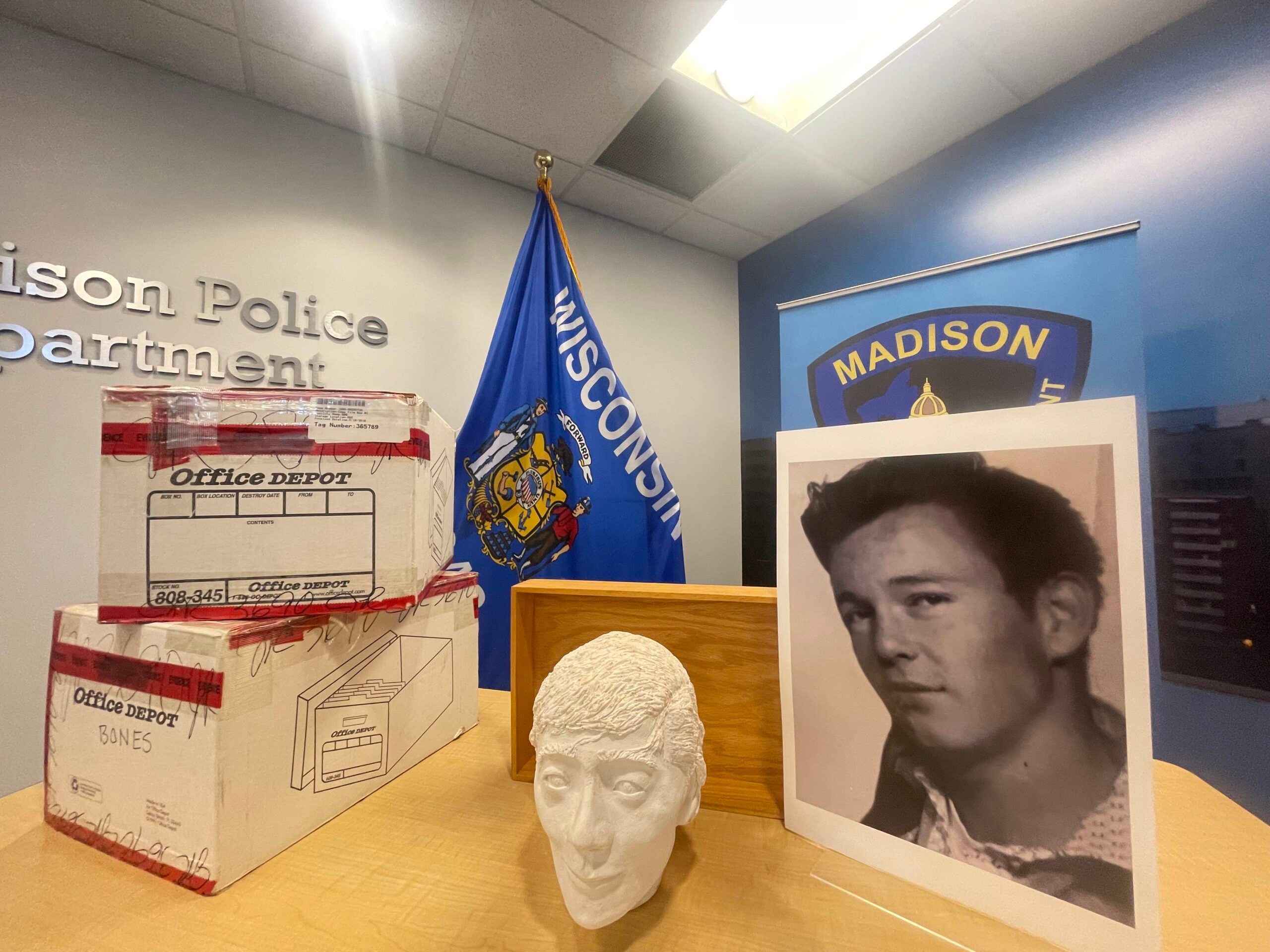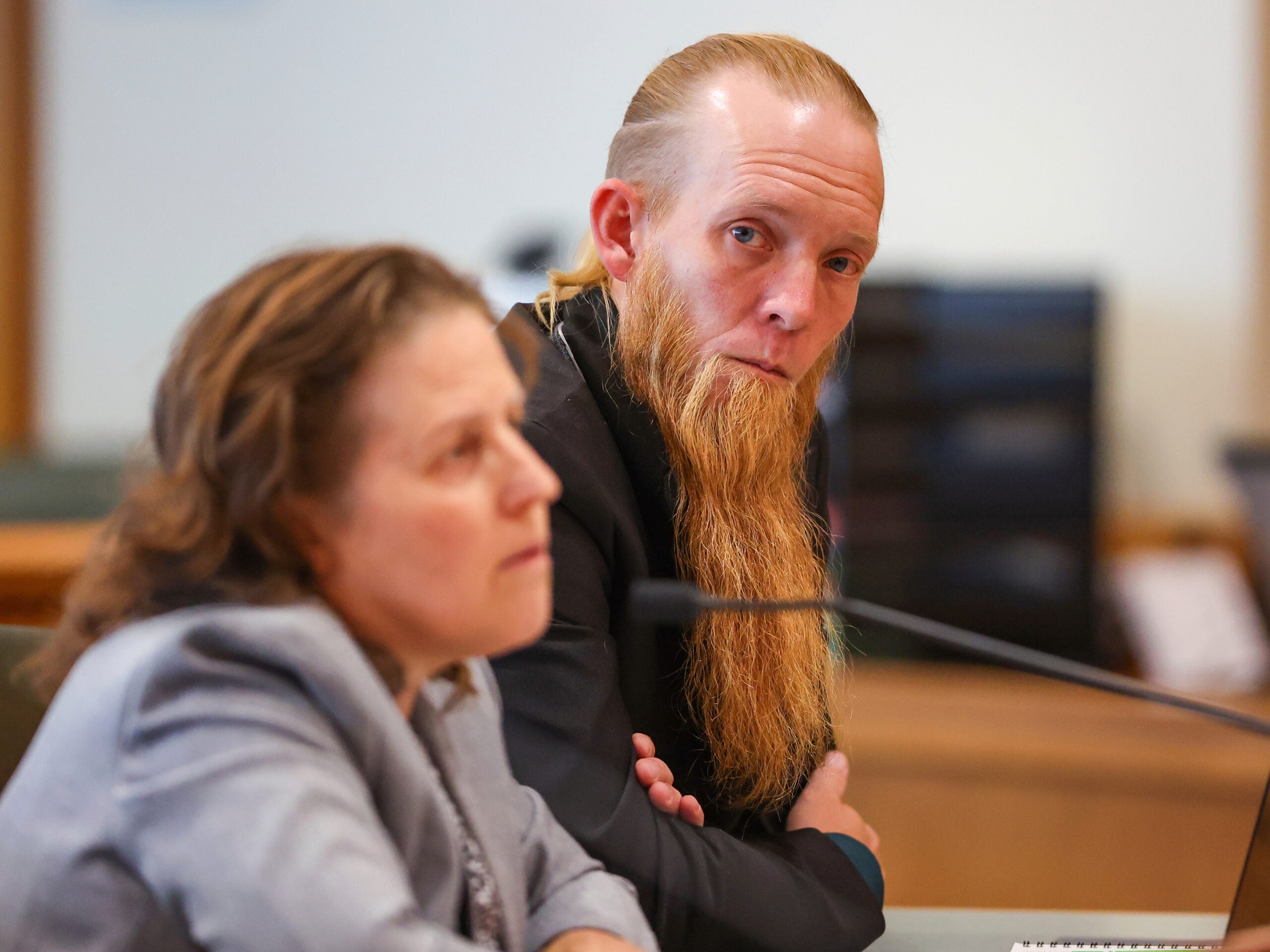After more than three decades, investigators finally have a name to tie to a gruesome mystery.
The skeletal remains found on Sept. 3, 1989 in the chimney of a Madison business belong to Ronnie Joe Kirk, Madison Police announced Monday.
But more questions remain in the death of Kirk, whose remains were discovered in the process of renovating a music shop nearly 35 years ago.
News with a little more humanity
WPR’s “Wisconsin Today” newsletter keeps you connected to the state you love without feeling overwhelmed. No paywall. No agenda. No corporate filter.
Police unearthed a skeleton after the owner of the since-shuttered Good ‘n Loud Music store on University Avenue spotted a skull that was visible through a pipe connecting the boiler to the building’s chimney.
Investigators now know Kirk was born in 1942 in Tulsa, Oklahoma, and he was raised by genetic relatives who adopted him.
But they still don’t know exactly how or when Kirk died, Madison Police Chief Shon Barnes said.
“Valuable information may be gone,” Barnes told reporters. “It was a skeleton when we found it, so time of death is going to be difficult.”
A forensic autopsy previously concluded the remains belonged to a genetic male, who was between 18 and 35 years old and about 5 feet 7 inches tall.
Police shared Monday that Kirk was raised in the Tulsa area and had ties to Texas and Alabama.
But Barnes said they’re searching for information about what brought Kirk to Madison, and how much time he spent in the city.
“That’s why we need the help from the community,” Barnes said. “Someone will remember, and we’ll do everything that we can to try to trace down if he worked here, he if lived here, if he was just passing through or going somewhere else.”
The police department has released a photo of Kirk, which was provided by his family and taken sometime in the early 1960s, when Kirk would have been in his late teens or early 20s.

Advancing DNA technology made identification possible
Thanks to advancing technology, investigators were able to use DNA from hair samples to identify the man who had come to be known as “Chimney Doe.”
Traditionally, forensic analysis of hair has focused on getting genetic material from cells attached to the hair’s root. But, in the case of Chimney Doe, investigators had rootless hair, which can make it difficult to extract enough genetic material.
In 2019, Madison Detective Lindsey Ludden reached out to the DNA Doe Project, hoping a new method could provide more information about Chimney Doe’s remains.
The nonprofit uses emerging forensic technology and genealogy techniques to help police solve cases of unidentified people at no charge to law enforcement agencies.
Eventually, scientists at the California-based Astrea Forensics laboratory were able to get enough DNA from Kirk’s rootless hairs, a process that took over two years.
After uploading Chimney Doe’s DNA profile to databases, volunteer genealogists with the DNA Doe Project spent about six months mapping out Kirk’s family tree.
“This was such a unique case with adoption, and multiple generations of different marriages, despite having a relatively close DNA match in the family,” Gwen Knapp of the DNA Doe Project said in a statement. “The shrewd genealogy work done by my team was amazing to tease out the various relationships. We’re so excited that we can give Ronnie Kirk his name back and hope his family has some closure for Ronnie being missing for so long.”
Who was Ronnie Joe Kirk?
Police disclosed Monday that Kirk was married and divorced twice, and he fathered children. But they declined to share further details, adding that his family has asked for privacy.
Kirk’s remains were found without a driver’s license or any other form of ID. Police have previously said the skeleton was found with what was described as a paisley-print dress and an iron cross necklace.
That’s led to speculation that Kirk could have been targeted for violence because of his gender identity or expression.
“People are going to speculate about the so-called dress, and we feel that it was mislabeled as such since we have found no further evidence to suggest Ronnie ever identified as anything other than male,” said Megan Pasika, co-team leader for the DNA Doe Project.
Barnes said he’s hopeful tipsters will come forward with more details about Kirk’s life.
“How he identified, I don’t know,” Barnes said, adding it may be challenging to pinpoint details that are decades old. “Whoever may be involved may be older, and so we need to give them as much information as we can, so that they can see if it jogs their memory.”
Madison detective seeks tips as investigation enters new phase
People can submit tips to Ludden at 608-229-8215 or LLudden@cityofmadison.com.
“I’m open to all calls and any input of people that might have shared a moment in time with Ronnie and can help me fill in who he was and where he spent his time, places he worked, anything,” Ludden said. “In most of our cases, for death investigations, we start with family and in this case, we’ve gone 34 years not knowing who he was, and so we’re kind of starting a new phase of the investigation at this point.”
Wisconsin Public Radio, © Copyright 2025, Board of Regents of the University of Wisconsin System and Wisconsin Educational Communications Board.







